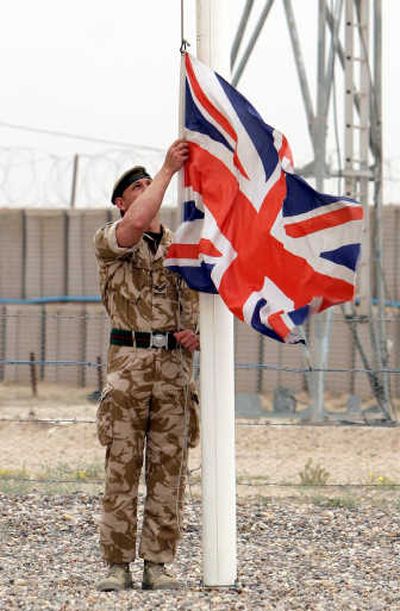British soldiers leave last base in key Iraq city

LONDON – British soldiers began withdrawing Sunday from their last base in the southern Iraqi city of Basra, paving the way for fresh troop cuts and fueling worries about the security of the country’s second-largest city and the surrounding region.
U.S. and Iraqi authorities have expressed concern that a broader British drawdown could jeopardize the region’s rich oil resources and the land supply line from Kuwait to Baghdad and beyond. Some analysts also fear that British withdrawal could exacerbate a violent power struggle between rival Shiite groups in the sect’s southern heartland.
Around 550 soldiers were leaving the downtown Basra Palace, one of deposed President Saddam Hussein’s former compounds, to join 5,000 other personnel at an air base seven miles away on the fringes of the city.
The Iraqi military sent hundreds of reinforcements to the city to prevent Shiite militias and criminal gangs from expanding their influence once the British have gone.
Former Prime Minister Tony Blair reduced the number of British troops in Iraq from 7,000 to 5,500 in February and left open the option of pulling out around 500 more personnel once Basra Palace was handed back to Iraqis.
Basra Palace was to house British soldiers and diplomatic staff after the 2003 U.S.-led invasion and has come under daily mortar and rocket attack in recent months.
U.S. officials have raised concerns about the prospect of British troops leaving the city, which fell under the influence of Shiite religious parties and militias, some with ties to Iran, after the January 2005 election that brought Prime Minister Nouri al-Maliki to power.
The police force is heavily infiltrated by militias. Political rivals, liquor dealers, DVD shop owners and anyone who violated different groups’ interpretations of Islam was subject to assassination by death squads.
The International Crisis Group, a Brussels based think tank, said in a June report that unconstrained militias were destabilizing Basra and that locals believed British forces had been driven out.
“Relentless attacks against British forces in effect had driven them off the streets into increasingly secluded compounds,” the report said. “Basra’s residents and militiamen view this not as an orderly withdrawal but rather as an ignominious defeat.”